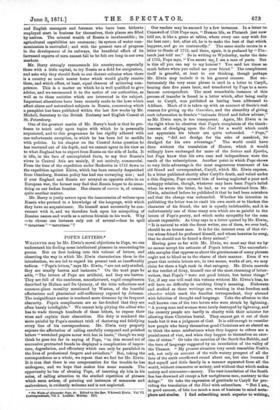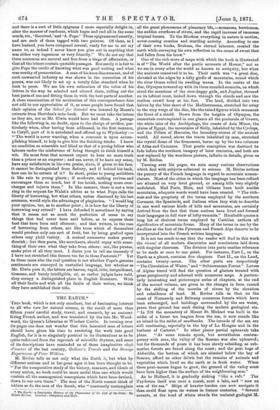POPE'S LETTERS.* WHATEVER may be Mr. Elwin's moral objections to
Pope, we can understand his finding some intellectual pleasure in annotating his poems. But on first looking into this volume of letters, and observing the way in which Mr. Elwin characterizes them in the introduction, we are led to regard his present task as insufferably tedious. "Pope's letters," says Mr. Elwin, "are not only studied, they are usually barren and insincere." On the next page he adds, "The letters of Pope are artificial, and they are barren. They are full of the cumbrous, manufactured, vapid compliments described by Hallam and De Quincey, of the trite reflections and common-place morality mentioned by Warton, of the boastful affectations and pharisaical self-sufficiency exposed by Johnson. The insignificant matter is rendered more tiresome by its frequent obscurity. Pope's compliments are so far-fetched that they are often barely intelligible." We cannot help pitying the editor who has to wade through hundreds of these letters, to expose their vices and explain their obscurities. His duty is rendered the more painful by Pope's constant trick of doctoring and falsifying every line of his correspondence. Mr. Elwin very properly exposes the affectation of calling carefully composed and polished letters "wretched papers never writ but in haste," though we may think he goes too far in saying of Pope, "in this second set of successive protracted frauds he displayed a complication of impos- ture, degradation, and effrontery which can only be paralleled in the lives of professional forgers and swindlers." But, taking the correspondence as a whole, we repeat that we feel for Mr. Elwin. It is true that there is one compensation for the trouble he has undergone, and we hope that makes him some amends. The opportunity he has of abusing Pope, of inserting sly hits in his notes, of calling attention to the studied repetition of phrases which seem artless, of pointing out instances of meanness and malevolence, is evidently welcome and is not neglected.
* 21e Works of Alexander Pope, ee. Edited by the Rev. Whitwell Elwin. Vol. VI. Correspondence, Vol. L London: Murray. 187L Our readers may be amused by a few instances. In a letter to Cromwell of 1708 Pope says, "Human life, as Plutarch just now told me, is like a game at tables, where every one may wish fon the best cast ; but, after all, he is to make the best of that which. happens, and go on contentedly." The same simile occurs in a- letter to Steele of 1712, and there, again, it is prefaced by "Plu- tarch just told me." So in writing to Wycherley, under the date- of 1705, Pope says, "You assure m,f■a, I am a man of parts. But is this all you can say to my honour ? You said ten times as. much before when you called me your friend." The compliment itself is graceful, at least to our thinking, though perhaps. Mr. Elwin may include it in his general censure. But un- fortunately the very same phrase is used in a letter to Caryll, bearing date five years later, and transferred by Pope to a more- famous correspondent. The most remarkable instance of this- process of transfer is found in a letter which, after being really sent to Caryll, was published as having been addressed to Addison. Much of it is taken up with an account of Steele's real. reasons for giving up the Guardian, and the absurdity of giving: such information to Steele's "intimate friend and fellow adviser," as Mr. Elwin says, is too transparent. Again, Mr. Elwin is in the right when he observes that Pope's complaints of the thank- lessness of drudging upon the Iliad for a world which could.
not appreciate his labour are quite unfounded. " Pope," he says, "did not drudge for the sake of mankind, he drudged for his own advantage." The world could have- done without the translation of Homer, which it would. willingly have exchanged for more of the Satires and Epistles,. but Pope knew that his own ease and independence were the result of the subscriptions. Another point in which Pope shows to very little advantage is the most ungenerous treatment of his- old friend and correspondent, Caryl!, which Mr. Elwin exposes.. In a letter published shortly after Caryll's death, and veiled under a thin disguise, Pope accused him of having neglected a poor and. unhappy relation, though, whatever may have been Pope's belief when he wrote the letter, he had, as we understand from Mr. Elwin, admitted before he published it that he had been mistaken. and that the charge was unfounded. Whether his intention in publishing the letter was to exalt his own merit or to blacken the character of his friend, the act is equally indefensible, and it is unfortunately one of those many acts which are so painful to the lovers of Pope's poetry, and which make sympathy for the man almost impossible. As Gray says in a letter quoted by Mr. Elwin,. "It is natural to wish the finest writer, one of them, we ever had,. should be an honest man. It is for the interest even of that vir- tue whose friend he professed himself, and whose beauties he sung,. that he should not be found a dirty animal."
Having gone so far with Mr. Elwin, we must say that we by, no means accept his estimate of Pope's letters. The uncomfort- able scruples that oppress us about the genuineness of many phrases. oughtnot to blind us to the charm of their manner. Even if we grant that certain letters are, in two senses, works of rat, we may claim for them a high rank in that category. Mr. Elwin marvels. at the verdict of Gray, himself one of the most charming of letter-- writers, that Pope's "were not good letters, but better things." Yet, if any one will read this volume without Mr. Elwin's bias, be will have no difficulty in catching Gray's meaning. Elaborate. and studied as these writings are, wanting in that freedom and. abandon which mark the familiar correspondent, they abound with felicities of thought and language. Take the allusion to the well known case of the two lovers who were struck by lightning.. "A young man and woman were lately destroyed by lightning, and the country people are hardly in charity with their minister for allowing them Christian burial. They cannot get it out of their- beads but it was a judgment of God. It is odd enough to consider- how people who fancy themselves good Christians are so absurd as. to think the same misfortunes when they happen to others are & punishment of vice, and when they happen to themselves an exer- cise of virtue." Or take the mention of the South Sea Bubble, and. the turn of language suggested by an inundation of the valley of the Thames. "My present situation very much resembles Noah's. ark, not only on account of the wide watery prospect of all the face of the earth overflowed round about me, but also because r find myself and little family in a manner separated from all tha world, without commerce or society, and without that which make& society and commerce—money. The vast inundation of the South Sea has drowned all except a few unrighteous men, contrary to the deluge." Or take the expression of gratitude to Caryll for pro- viding the translation of the Iliad with subscribers. "But I am,, in good earnest, of late too much a man of business to mind meta- phors and similes. I find subscribing much superior to writing„ and there is a sort of little epigrams I more especially delight in, after the manner of rondeaus, which begin and end all in the same words, viz., 'Received,' and 'A. Pope.' These epigrams end smartly, and are each of them tagged with two guineas. Of these, as I have learned, you have composed several, ready for me to set my name to, as indeed I never knew you give out in anything that was either very ingenious or very friendly." We do not say that these sentences are natural and free from a tinge of affectation, or that all the letters contain quotable passages. But surely it is fair to give Pope the credit of knowing what was good writing and what was worthy of preservation. A man of his keen discernment, and of such unwearied industry as was shown in the correction of his poems, was not likely to set up a totally false standard when he took to prose. We see his own estimation of the value of his letters in the way he selected and altered them, culling out the best parts of one and fitting them in with the best parts of another. A close examination of the mechanism of this correspondence does not add to our appreciation of it, as some people have found that their opinion of the School for Scandal was lowered by Moore's extracts from Sheridan's note-book. But we must take the letters as they are, not as Mr. Elwin would have had them. A passage like the following is, no doubt, open to the charge of artifice, par- ticularly when, after having been addressed, in the first instance, to Caryll, part of it is antedated and offered up to Wycherley "'The world is never wanting, when a coxcomb is upon accom- plishing himself, to help to give him the finishing stroke. I know no condition so miserable and blind as that of a you.ng fellow who labours under the misfortune of being thought to think himself a wit. He must from that moment expect to hear no more truth than a prince or an emperor ; and can never, if he have any sense, have any satisfaction in his own praise, since, if given to his face, it cannot be distinguished from flattery, and if behind his back, how can he be certain of it? In short, praise to young scribblers is like rain to young plants ; if moderate, nothing revives and encourages them so much, but if too lavish, nothing more over- charges and injures them." In like manner, there is not a true ring in the request for Walsh's advice as to what Pope calls the liberty of borrowing, but what others, unless disarmed by his last sentence, would style the advantages of plagiarism. "I would beg your opinion, too, as to another point ; it is how far the liberty of borrowing may extend? I have defended it sometimes by saying that it seems not so much the perfection of sense to say things that had never been said before, as to express these best that have been said oftenest ; and that writers, in the case of borrowing from others, are like trees which of themselves would produce only one sort of fruit, but by being grafted upon others may yield variety. A mutual commerce makes poetry nourish; but then poets, like merchants, should repay with some- thing of their own what they take from others ; not, like pirates, snake prize of all they meet. I desire you to tell me sincerely if I have not stretched this licence too far in these Pastorals?" Yet in these cases also the real question is not whether Pope's genuine sentiments are conveyed in unstudied language, but whether as Mr. Elwin puts it, the letters are barren, vapid, trite, insignificant, tiresome, and barely intelligible, or, as earlier jqdges have held, they occupy a distinguished place in English literature. With all their faults and with all the faults of their writer, we think they have established their title.



































 Previous page
Previous page